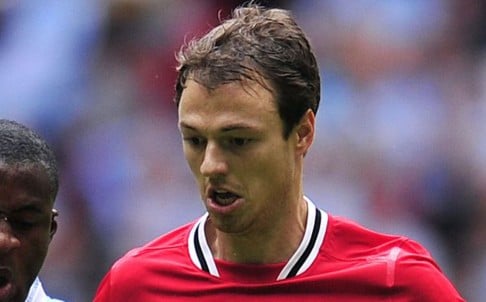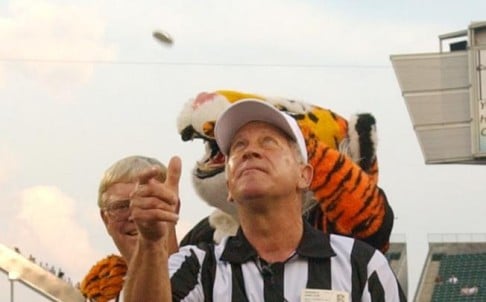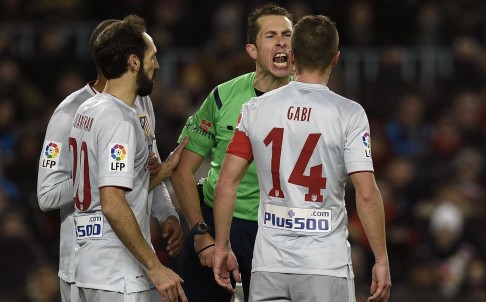Fifa revisits offside rules
Fifa's re-definition of key terminology should allow match officials to make clearer decisions
Manchester United's Jonny Evans. Photo: AFP
The much-quoted saying "If he's not interfering with play, what's he doing on the pitch?" is usually incorrectly attributed to former Liverpool manager Bill Shankly instead of Tottenham Hotspur manager Bill Nicholson.
Although decades old, it refers to the essence of the offside law, which is to penalise a player for being in an offside position when he is involved in active play.
The problem is the exact definition of being "involved in active play". This has generated much derision, denunciation and debate among disgruntled managers, players and supporters when a team are obviously disadvantaged by conceding a goal due to a contentious offside call.
The offside rule defines active play as either interfering with play, interfering with an opponent, or gaining an advantage by being in that position. Over the years, these three seemingly straightforward statements have been misunderstood, misrepresented and misinterpreted.
An example occurred on Boxing Day last year when Manchester United were on the unfavourable end of a non-offside decision since Newcastle United's second goal was attributed as an own goal.
This was when Manchester United defender Jonny Evans stuck out his leg and diverted a Newcastle United cross into his own net. Controversy ensued because as the cross was played in Newcastle forward Papiss Cisse was in an offside position. However, a player being in an offside position is not an offence in itself. The consideration here is whether Cisse was involved in active play.
Assistant referee Jake Collins could clearly see Cisse standing in an offside position. Replays revealed the ball never made contact with Cisse as Evans deflected it past his goalkeeper. But Collins was unsure whether Cisse had touched the ball or not and, as taught in the top levels, correctly raised his flag to indicate an offside offence.
Referee Mike Dean was located centrally on the pitch and had an excellent view of the action. From his vantage point, Dean knew Cisse had not touched the ball and therefore correctly deemed he was not involved in active play by interfering with play or an opponent.
Dean showed his professionalism by approaching Collins to confer with him about the incident. So, although Collins had raised his flag to signal offside, Dean correctly allowed the goal to stand.
However, then Manchester United manager Alex Ferguson flew into a rage and vented his anger at the assistant referee, fourth official and referee. Incidentally, the FA chose to ignore Ferguson's blatant abuse of match officials.
In an attempt to resolve any confusions involving active play, Fifa has introduced amendments to official interpretations of "being involved in active play". These refer specifically to the terms "interfering with an opponent" and "gaining an advantage by being in that position".
By "interfering with an opponent", the previous interpretation was "preventing an opponent from playing or being able to play the ball by clearly obstructing the opponent's line of vision or movement or making a gesture or movement which, in the opinion of the referee, deceives or distracts an opponent".
This is now shortened to "preventing an opponent from playing or being able to play the ball by clearly obstructing the opponent's line of vision or challenging an opponent for the ball".
According to the Boxing Day incident, Cisse neither obstructed the movement of Evans nor made a deceptive or distracting gesture or movement. To help clarify things for future seasons it can be seen that, should the same circumstance happen again, Cisse being in an offside position would still not prevent Evans from playing the ball.
In "gaining an advantage by being in that position", the previous interpretation was "playing a ball that rebounds to him off a goalpost or the crossbar having been in an offside position or playing a ball that rebounds to him off an opponent having been in an offside position".
This is now explained as "playing a ball that i) rebounds or is deflected to him off the goal post, crossbar or an opponent having been in an offside position; and ii) rebounds, is deflected or is played to him from a deliberate save by an opponent having been in an offside position. A player in an offside position receiving the ball from an opponent, who deliberately plays the ball (except from a deliberate save), is not considered to have gained an advantage."
The upshot is that anyone who reads the laws will better understand Fifa's stance on offside.
Furthermore, following the retirement of Ferguson, it is hoped there will be less abuse of match officials on contentious decisions … although there is the notable return of Chelsea manager Jose Mourinho.
Agree or disagree? Contact Rational Ref at rationalref@gmail.com
This article appeared in the South China Morning Post print edition as New offside rules aim to keep everyone onside
PUBLISHED : Friday, 19 July, 2013












